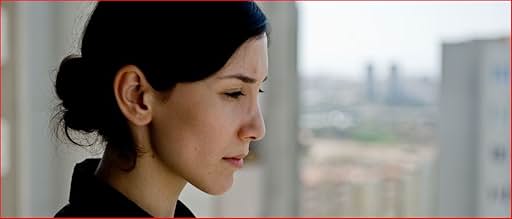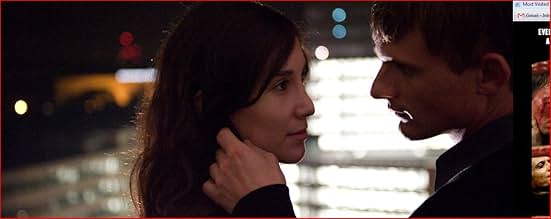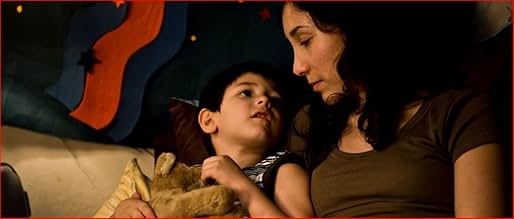NOTE IMDb
7,5/10
5,6 k
MA NOTE
Pour protéger son fils de son mari violent, Umay, une jeune femme turque d'origine allemande, quitte Istanbul et retourne vivre dans sa famille à Berlin. Mais les membres de sa famille ne l'... Tout lirePour protéger son fils de son mari violent, Umay, une jeune femme turque d'origine allemande, quitte Istanbul et retourne vivre dans sa famille à Berlin. Mais les membres de sa famille ne l'accueillent pas comme elle l'espérait.Pour protéger son fils de son mari violent, Umay, une jeune femme turque d'origine allemande, quitte Istanbul et retourne vivre dans sa famille à Berlin. Mais les membres de sa famille ne l'accueillent pas comme elle l'espérait.
- Récompenses
- 30 victoires et 14 nominations au total
Gümeç Alpay Aslan
- Zeynep
- (as Gümec Alpay)
Avis à la une
Umay leaves her abusive husband Kemal in Istanbul with her son Cem to go home to Germany. Her father Kader is concerned about the family's honor. The older brother Mehmet is angry. The youngest brother Acar is scared but kind. Kemal rejects Umay but wants his son Cem back. As Kader and Mehmet try to force the situation, Umay calls the police and she escapes with Cem to a women's shelter. She finds a job with a supportive boss and a new boyfriend. Her younger sister Rana is rejected by her fiancee's father due to the situation. Rana tells her mother that she's desperate to marry Duran because she's secretly pregnant. Kader has to pay off the father to get them married. Umay shows up unexpectedly at the wedding and has a meltdown. Even Acar is forced to confront the lost of family honor.
The portrait of the lost of family honor is devastating. The pressure feels real. The need for Umay to reconnect with her family does feel unreasonable and excessive. I doubt a reasonable Umay would show up at the wedding. After the wedding, it seems impossible for her to go to the hospital especially carrying her son with her. Then the final scene has too many twists. It only accentuates the twisty manufactured nature of the writing. Writer/director Feo Aladag needs to tone down some of the more melodramatic developments in the last act.
The portrait of the lost of family honor is devastating. The pressure feels real. The need for Umay to reconnect with her family does feel unreasonable and excessive. I doubt a reasonable Umay would show up at the wedding. After the wedding, it seems impossible for her to go to the hospital especially carrying her son with her. Then the final scene has too many twists. It only accentuates the twisty manufactured nature of the writing. Writer/director Feo Aladag needs to tone down some of the more melodramatic developments in the last act.
The basic plot is simple: a young lady with a crazy in-laws feds up and leaves making her a total outcast. The acting seemed a bit too dramatic and overly polished. The actors are obviously talented and have done their best, but it showed that they were trying too hard, which took away the realism I was anticipating. More than a few scenes were simply yelling and slapping which I've found quite raw. The close-ups were nice generally with beautiful faces, occasionally with oblique views. At times, when we were shown a scene with people staring at each other silently which meant that the discussion was over, I wondered if that was really the case and not if we were witnessing a zen moment. As a side note, I just have to point out that the subject of film has little to do with religion or being a "muslim". The problem is far too deep which is really a sociological phenomena rooted in dogmatic cultural upbringings and a feudal life style (mostly) of the eastern part of country where people are just a dot in the family picture rather than individuals with autonomy. You could see that nobody in the family wanted to be a part of what was going on but they could not behave otherwise -- they were slaves of their communities even thousands of miles away.
This film is very realistic. Its detailed depiction of one Turkish family living in Berlin casts overtones for a greater problem of European multiculturalism. But forget the wider scope of those implications for now. The film is very focused on Turkish culture within Germany and one of its great weaknesses: what it considers to be saving the "honor" of the family. The older daughter in the film has left her violent and abusive husband in Turkey and moved back to her family in Germany. Her parents immediately side with her husband, and they repeatedly ask the daughter to return to him. But the daughter has sacrificed much to get away, and will not return. After an attempt to kidnap her son and return him to the father fails, she moves out...and moves again...and moves again as problems mount. Her younger brother and sister, although initially supportive of her, slowly begin to turn against her as the shame of her living independently with child causes the Turkish community to isolate the family. This ultimately leads to a final decision by the men in the family, with tragic results.
The family is Muslim, although Islam is not portrayed as the reason why the family is shamed by the older daughter. In the culture, it is easy for an independent woman to bring shame to the family, especially if she leaves her husband. At no time do the parents ever seriously consider the perspective of their daughter. It is quite clear, she has to maintain the family honor at all costs; which in this case means returning to her husband. As the daughter continues to make unwise choices by maintaining contact with her family because she loves them, the unwritten codes of this "honor" system will drive the family into greater acts of cruelty. This film can make you very angry indeed at the injustice to women done by patriarch based communal cultures. The "honor" that they cling to is so twisted. It is based on a superficial sense of righteousness that has little basis in truth. It is more concerned with appearances than justice. More concerned with blind obedience than righteousness. And that concept is promoted in Islam, though not exclusively.
This film should be mandatory viewing for any woman in similar straits as the main character in the film who has needed to separate from the family for safety. The Germans have provided good resources for such women, but they are advised, "For now, avoid contact with your family." One of this beautifully done film's main points is: Once you leave or are forced to leave the family, it may be for good. You cannot expect your family to sympathize with you, support you, or even accept you as family. There is a good chance they WILL turn against you if the community slanders the family. And a woman who leaves her abusive husband, lives alone, calls the police for safety, or takes any action to safeguard her life and livelihood may very well be thought of as nothing more than a "whore" by the rest of the German Turkish community. Contact your family again at risk to your life! I would wish that Turkish men (those who are perpetrators, that is) who see this would also feel ashamed for some of their sexist standards, but I don't know if they would...
The film is very moving and well done. The actors all fulfill their roles, particularly the leading lady. The eye communication of the cast is extremely profound, leaving you wondering about all of the unspoken thoughts stewing in their heads. The writing allows sympathy with all of the characters while still clearly pointing out who is right and who is wrong. You see they all have deep passions about righteousness. It's just that some are righteous and others are not. It is a simple story that casts deep shadows on complexities of cultural clashes. This is not a film that will break grounds in cinematography, but it is a brave film and urgent as the Muslim (both immigrant and native) population rises in Europe. Hopefully this will start a trend that will cause the Turkish culture to think about what true honoring of the family really is.
The family is Muslim, although Islam is not portrayed as the reason why the family is shamed by the older daughter. In the culture, it is easy for an independent woman to bring shame to the family, especially if she leaves her husband. At no time do the parents ever seriously consider the perspective of their daughter. It is quite clear, she has to maintain the family honor at all costs; which in this case means returning to her husband. As the daughter continues to make unwise choices by maintaining contact with her family because she loves them, the unwritten codes of this "honor" system will drive the family into greater acts of cruelty. This film can make you very angry indeed at the injustice to women done by patriarch based communal cultures. The "honor" that they cling to is so twisted. It is based on a superficial sense of righteousness that has little basis in truth. It is more concerned with appearances than justice. More concerned with blind obedience than righteousness. And that concept is promoted in Islam, though not exclusively.
This film should be mandatory viewing for any woman in similar straits as the main character in the film who has needed to separate from the family for safety. The Germans have provided good resources for such women, but they are advised, "For now, avoid contact with your family." One of this beautifully done film's main points is: Once you leave or are forced to leave the family, it may be for good. You cannot expect your family to sympathize with you, support you, or even accept you as family. There is a good chance they WILL turn against you if the community slanders the family. And a woman who leaves her abusive husband, lives alone, calls the police for safety, or takes any action to safeguard her life and livelihood may very well be thought of as nothing more than a "whore" by the rest of the German Turkish community. Contact your family again at risk to your life! I would wish that Turkish men (those who are perpetrators, that is) who see this would also feel ashamed for some of their sexist standards, but I don't know if they would...
The film is very moving and well done. The actors all fulfill their roles, particularly the leading lady. The eye communication of the cast is extremely profound, leaving you wondering about all of the unspoken thoughts stewing in their heads. The writing allows sympathy with all of the characters while still clearly pointing out who is right and who is wrong. You see they all have deep passions about righteousness. It's just that some are righteous and others are not. It is a simple story that casts deep shadows on complexities of cultural clashes. This is not a film that will break grounds in cinematography, but it is a brave film and urgent as the Muslim (both immigrant and native) population rises in Europe. Hopefully this will start a trend that will cause the Turkish culture to think about what true honoring of the family really is.
This is such a difficult film to watch. It's the story of a Turkish woman trying to rise up beyond her culture and religion to pursue her autonomy. It's painful to watch given the strong performances/direction and script which will both shock you and get you reflecting on the current state of affairs.
The protagonist encounters various obstacles towards her pursuit of happiness, sadly within her own family. This is relatable regardless of your gender, cast or creed. The main actress Sibel Kekilli does a fantastic job of drawing the viewer into her turmoil. The pain she endures was truly palpable. A beautiful film.
The protagonist encounters various obstacles towards her pursuit of happiness, sadly within her own family. This is relatable regardless of your gender, cast or creed. The main actress Sibel Kekilli does a fantastic job of drawing the viewer into her turmoil. The pain she endures was truly palpable. A beautiful film.
The treatment of Muslim societies in the media in general and in film in particular has been subject to much agenda setting and bias. On the one hand, this has led to frequently arrogant defamation of the cultures of one fifth of humanity, on the other hand, the discourse has helped to highlight problems of Muslim integration which are often ignored under the convenient excuse of multiculturalism. What is more important: respect for other cultures living among us or concern for the plight of the individual subjected to an excessive chauvinism that allows for nothing but submission to it?
Feo Aladag's position on this is clear, but she avoids simplifications by sticking to one woman's story, and keeping that story close, while not identical, to the events that inspired it - namely the much publicized 2005 murder of Hatun Sürücü in Berlin, albeit with a surprising twist. Some may find the depictions of a regressive macho cult in German-Turkish families and social life exaggerated, especially since the acting of the supporting cast is a bit shaky at times. But as someone who has lived in a Turkish neighborhood in Berlin, I have to declare it's not. It's disturbingly close to the truth - not the distorted truth of tabloids, but the truth of people I'm close to.
The minimalistic approach of the film would usually render it a rather harmless affair, in spite of its controversial subject matter - were it not for Sibel Kekilli's outstanding performance, for which she received, among other awards, best actress at the Tribeca festival. Her heartfelt, knowing and yet forgiving gaze at the suffocating world she lives in speaks of personal experience with the role she portrays. 'When we leave' establishes her as the most exciting German actress of today.
It should be noted, by the way, that Islamic law does not condone honorary murders and considers these just as much as crimes as Western law does. Also, this practice is not exclusive to Muslim societies, but used to be widespread in Christian countries as well, where it might still occur as a justification for homicide. But these clarifications could not have been included in this film, which tells one story, and tells it well.
Feo Aladag's position on this is clear, but she avoids simplifications by sticking to one woman's story, and keeping that story close, while not identical, to the events that inspired it - namely the much publicized 2005 murder of Hatun Sürücü in Berlin, albeit with a surprising twist. Some may find the depictions of a regressive macho cult in German-Turkish families and social life exaggerated, especially since the acting of the supporting cast is a bit shaky at times. But as someone who has lived in a Turkish neighborhood in Berlin, I have to declare it's not. It's disturbingly close to the truth - not the distorted truth of tabloids, but the truth of people I'm close to.
The minimalistic approach of the film would usually render it a rather harmless affair, in spite of its controversial subject matter - were it not for Sibel Kekilli's outstanding performance, for which she received, among other awards, best actress at the Tribeca festival. Her heartfelt, knowing and yet forgiving gaze at the suffocating world she lives in speaks of personal experience with the role she portrays. 'When we leave' establishes her as the most exciting German actress of today.
It should be noted, by the way, that Islamic law does not condone honorary murders and considers these just as much as crimes as Western law does. Also, this practice is not exclusive to Muslim societies, but used to be widespread in Christian countries as well, where it might still occur as a justification for homicide. But these clarifications could not have been included in this film, which tells one story, and tells it well.
Le saviez-vous
- AnecdotesGermany's official submission for the Best Foreign Language Film Award at the 83rd Annual Academy Awards in 2011.
- ConnexionsFeatures Biçak Sirti (2007)
- Bandes originalesSO 36 - Party
Performed by Steffen Irlinger & Marian Mülle
(P) 2010 Colosseum Music Entertainment GmbH
Meilleurs choix
Connectez-vous pour évaluer et suivre la liste de favoris afin de recevoir des recommandations personnalisées
- How long is When We Leave?Alimenté par Alexa
Détails
Box-office
- Montant brut aux États-Unis et au Canada
- 19 631 $US
- Week-end de sortie aux États-Unis et au Canada
- 6 018 $US
- 30 janv. 2011
- Montant brut mondial
- 1 338 132 $US
- Durée1 heure 59 minutes
- Couleur
- Mixage
- Rapport de forme
- 2.35 : 1
Contribuer à cette page
Suggérer une modification ou ajouter du contenu manquant

Lacune principale
By what name was L'étrangère (2010) officially released in India in English?
Répondre

























